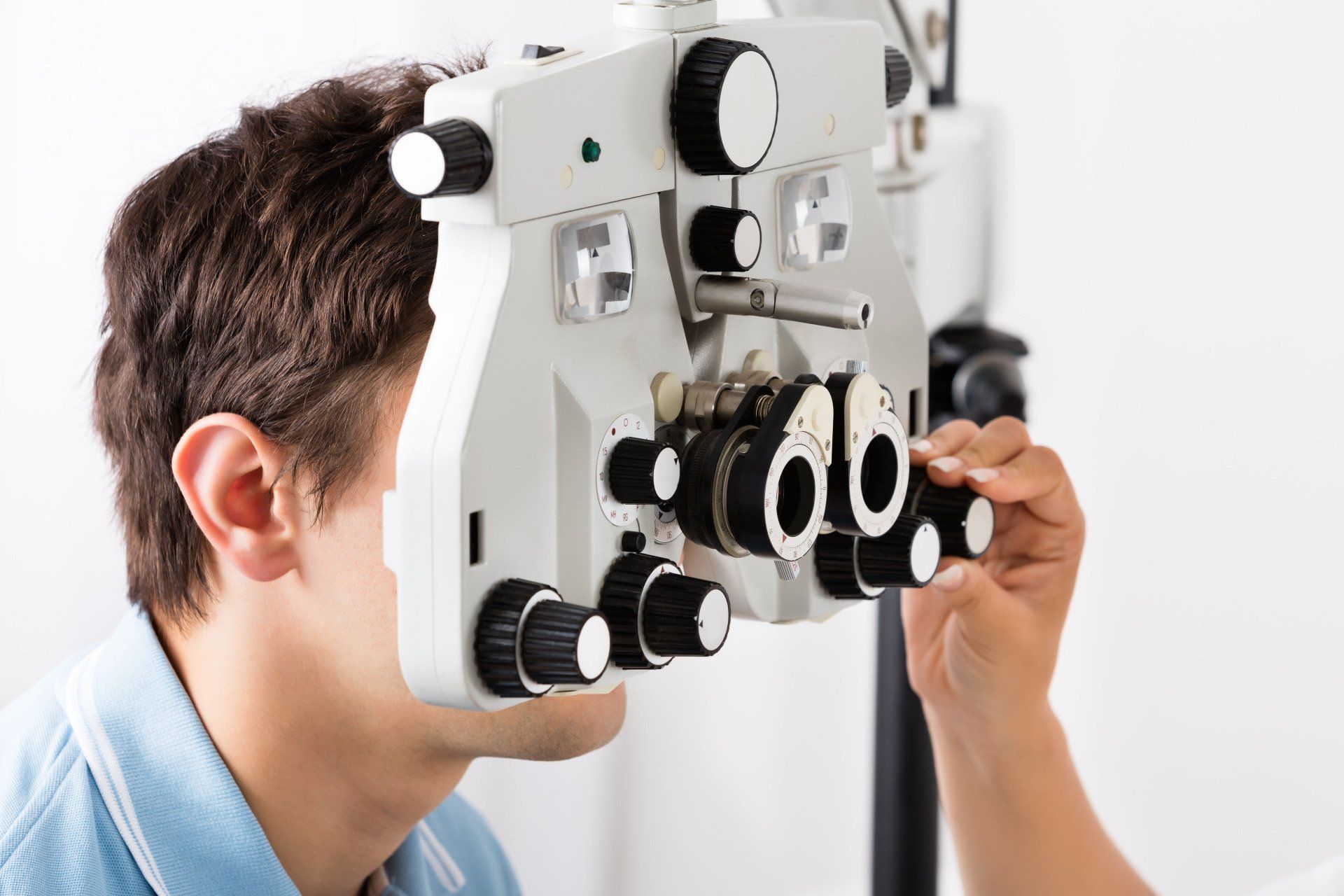What is a Refraction and Why is it often Non-Covered?
May 31, 2024
What is a Refraction and Why is it Often
Not Covered by a Patient’s Insurance?

For many people, an eye exam is a trip to the eye doctor (either an ophthalmologist or an optometrist) for a prescription for eyeglasses or contact lenses.
An Ophthalmologist (MD) is a medical doctor and provides services beyond a typical "routine" or “annual” eye exam. A Comprehensive Vision Exam when an underlying medical problem was either found at your optometrist at your last visit and referred to us, or you have been seeing us for some time now and we are continuing medical management & treatment.
An Optometrist (OD) will perform your "routine" or “annual” vision exam. If you have trouble with your vision (nearsighted, farsighted, astigmatism, etc.), your visit is considered a vision problem and will be billed to your vision plan. Vision plans may provide coverage or discounts for routine exams, glasses, and contact lenses. It is important that you understand your Vision Plan benefits.
What is a Refraction Test?
During your “routine” or “annual” vision exam, a refraction is the test done to determine the best corrected vision for your glasses prescription. A refraction must be performed if you wish to get a new or updated prescription for glasses and/or a contact lens prescription.
A refraction test is usually given as part of a routine eye examination. It may also be called a vision test. This test tells your eye doctor exactly what prescription you need in your glasses or contact lenses.
Normally, a value of 20/20 is considered to be optimum, or perfect vision. Individuals who have 20/20 vision are able to read letters that are 3/8 of an inch tall from 20 feet away.
If you don’t have 20/20 vision, you have what is called a refractive error. A refractive error means that the light is not bending properly when it passes through the lens of your eye. The refraction test will tell your doctor what prescription lens you should use in order to have 20/20 vision.
Why is this test used?
This test tells your doctor if you need prescription lenses, as well as what prescription lens you need to see properly. The results of the test are used to diagnose if a patient is suffering from astigmatism, farsightedness, or nearsightedness. The results can even help diagnose more serious problems such as macular degeneration or retinal detachment.
Refraction Policy
While a refraction is essential for a comprehensive eye exam, the charge for a refraction is only covered by some insurances but not all. The charges for a refraction are covered by some insurances (Vision Insurances at your Optometrist) but not by insurances when an eye exam is done at your Ophthalmologists office.
Some people have both health insurance--which covers medical eye problems--and vision insurance--which covers “routine” eye care (no medical problems) such as refractions and eyeglasses. If you come in for a routine exam with no medical eye problems or complaints and you have a vision plan, you will need to plan your eye exams with one of the local optometrists in the area, and then the refraction would most likely be covered by your vision insurance.
If you have a medical eye problem like cataracts, dry eyes, or glaucoma then Medicare and most other health insurances will only cover the medical portion of the eye exam and you will be responsible for the amount of the refraction.
The Cost of REFRACTION: Medicare does not cover refractions because the test is considered to be a part of a routine exam and not a medical need.
note:
Although our staff members are very knowledgeable about insurance plans, and try and stay up to date with day to day changes in policies, please remember that it is not the doctor’s or staff’s responsibility to know the details of your individual plan. It is to your benefit to be aware of possible deductibles and co-pays that are part of your plan. Your insurance plan may cover routine vision care at your Ophthalmologist and/or your Optometrists office, but if your deductible has not yet been met, you will still have to pay for the service until your deductible is met.
Your insurance is a contract between you, your employer, and the insurance company, not with the doctor.
We encourage you to speak with your insurance company PRIOR to your appointment about your plan’s specific details. Then, as always, feel free to ask us questions about how they will apply to your upcoming visit. We will do everything we can to help you better understand your policy, but the more knowledge you have about how it works ahead of time, the less frustrating it will be for you at the time of the exam.

At Shipp & Wooten Eye Center we have found that many of our patients have found relief from chronic migraines with Botox® injections. If you have fifteen or more headache days each month with migraine pain that lasts four hours or more, and regularly miss work or activities you enjoy because of debilitating migraine symptoms, there’s an effective alternative to taking headache and migraine prescription medications each time you feel a migraine coming on. Discover why Botox® may be the best proactive solution to managing your migraine pain. Botox® is the most prescribed branded chronic migraine treatment. Surprising, isn’t it? Most people think of Botox® as a cosmetic injectable that smoothes out fine lines and wrinkles across your forehead and around your eyes. While Botox® is certainly an effective anti-aging treatment, it’s also an FDA-approved chronic migraine therapy. When your provider at Shipp & Wooten Eye Center injects Botox® into seven specific muscle areas in your head and neck, the botulinum toxin — a neurotoxin that occurs in nature — helps reduce migraine pain for the next 12 weeks. How Botox® works to help you manage migraine pain? Botox® for migraines is a preventive medication. You don’t wait until you have symptoms to take it, but rather it helps prevent migraines from starting in the first place. Initially, you begin with two Botox® treatments spaced about 12 weeks apart. After your initial two Botox treatments, if you’re having fewer headaches each month, then you can continue receiving Botox injections every 12 weeks, or as your health care provider at Shipp & Wooten Eye Center recommends. During each appointment, your provider injects Botox® into the muscle groups of your head and neck. The needle is so tiny that you feel something similar to a pinprick, but nothing really painful. The injections aren’t deep either, so discomfort is minimal and temporary. Botox® goes just below your skin into the targeted muscle groups. The medication enters the nerve endings that contribute to your migraine pain. There, the botulinum toxins block the release of chemicals that transmit pain signals to your brain. As a result, the pain networks that usually come to life with the onset of a migraine no longer activate, so you don’t feel the usual pain and migraine symptoms. Botox® for migraines could cut your headache days in half. After a series of Botox® injections for migraine pain, you may have up to eight to nine fewer headache days each month. For many women and men, that’s like cutting your migraine symptoms in half — especially if you suffer from 15 or more headache days each month. Imagine waking up ready to take on the day more often than not, thanks to Botox® injections for migraine pain. When it comes to dealing with migraines, would you rather rely on prescription medications you take as soon as you feel symptoms coming on, or are you ready to try a more preventive approach with simple Botox® injections you only need every three months? We invite you to learn more about Botox® for migraines by scheduling a consultation today. Call our friendly office staff at the Shipp & Wooten Eye Center or request an appointment online.





